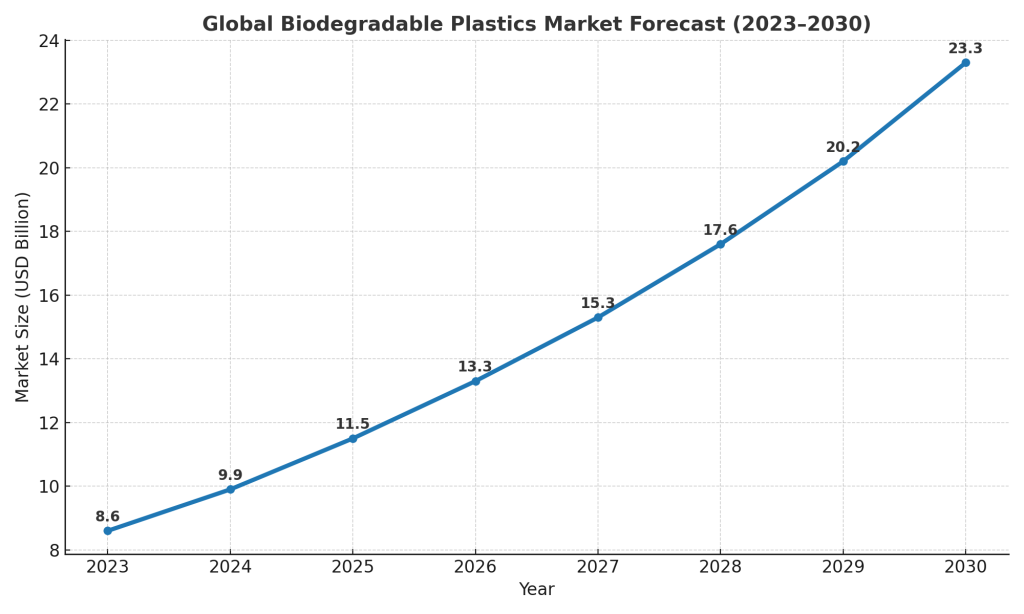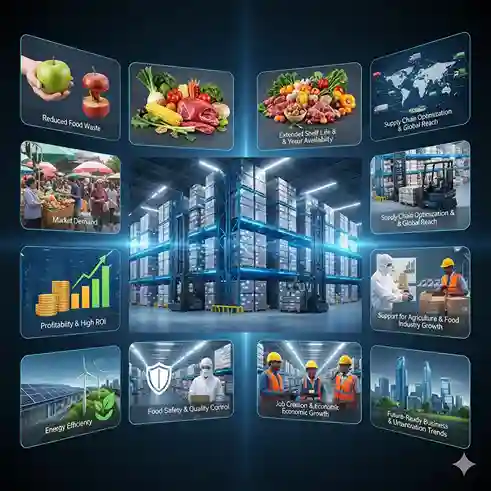Businesses that adopt eco-friendly products find themselves at the forefront of consumer demand, as well as regulatory support. Biodegradable products are a growing sector that offers tremendous opportunities to entrepreneurs and startups. Biodegradable products are being used for everything from packaging to cutlery. Entrepreneurs see them as an opportunity to not only make money but also to have a positive impact on our planet.
This article examines the six best biodegradable product business ideas. It also discusses global market trends, highlights current players, and gives an overview of manufacturing. The article provides entrepreneurs with actionable insights to help them choose the right product and build a sustainable business.
Market Outlook for Biodegradable Products
| Year | Market Size (USD Billions) | CAGR (%) | Key Drivers |
|---|---|---|---|
| 2023 | 8.6 | 14.9 | Ban on single-use plastics |
| 2024 | 9.9 | 14.9 | Packaging demand |
| 2025 | 11.5 | 14.9 | Consumer awareness |
| 2026 | 13.3 | 14.9 | Government Support |
| 2027 | 15.3 | 14.9 | Food service is growing. |
| 2028 | 17.6 | 14.9 | Industrial Applications |
| 2029 | 20.2 | 14.9 | E-commerce packaging |
| 2030 | 23.3 | 14.9 | Mainstream adoption |
The Asia-Pacific region, led by India and China, is emerging as a hub for biodegradable products manufacturing because it offers a massive consumer base, lower raw material costs, and supportive government regulations. Europe is the world leader in biodegradable product adoption because of its strict environmental policies.

Related: Exploring the Potential of Biodegradable Product Manufacturing
Top 6 Biodegradable Products for Business Ideas
1. Biodegradable Packaging Materials
Packaging accounts for almost 60% global demand for biodegradable materials. Biodegradable packaging is a lucrative market for entrepreneurs, as e-commerce and food delivery are growing rapidly. Biodegradable packaging, such as compostable bags and molded fibre packaging, is replacing plastic packaging.
Outline of the Manufacturing Process:
Manufacturers typically use raw materials such as corn starch or sugarcane pulp and process them into sheets or films through extrusion and thermal forming. They also add additives to improve strength and extend shelf-life.
Global Players:
- BASF SE (Germany).
- Novamont S.p.A. (Italy).
- Tipa Corp (Israel)
- NatureWorks LLC, USA
- Huhtamaki (Finland)
2. Tableware and Cutlery Made of Biodegradable Materials
In many countries, plastic cutlery or tableware is banned. This has opened the door to biodegradable options. Plates, bowls and spoons made of sugarcane bagasse or bamboo are becoming more popular. Customers include food service companies, catering services, and restaurants.
Outline of the Manufacturing Process:
Manufacturers collect and pulp raw materials such as cornstarch or bagasse, then mold them at high temperatures and pressure to produce cutlery and other tableware. For PLA-based cutlery, they ferment starch into lactic acid and polymerize it into biodegradable plastic.
Global Players:
- Biotrem (Poland – tableware made from wheat bran)
- Eco-Products Inc. (USA)
- GreenGood USA (USA)
- Pappco Greenware (India)
- Vegware (UK).
3. Biodegradable Sanitary Product
The hygiene industry generates significant amounts of plastic waste from sanitary pads and diapers. The demand for biodegradable products made from natural fibers such as banana fiber, cotton, bamboo or bamboo is increasing. Allied Market Research projects that the global biodegradable nappies market will reach USD 20 billion by 2031, growing at a CAGR of over 10%.
Outline of the Manufacturing Process:
This process uses biodegradable materials that are super-absorbent, natural fibres, and biobased films. Before sterilization and packaging, pads and diapers have absorbent cores layered on top of leak-proof biodegradable sheeting and an adhesive seal.
Global Players:
- Naty AB
- The Honest Company USA
- Heyday Care (India).
- Pura (UK)
- Eco Pea Co. (Canada)
Related: Biodegradable Personal Care Products: Diapers and Sanitary Napkins
4. Biodegradable agricultural films and Mulch
Plastic waste from agriculture is one of the largest contributors to contamination in soil and water. Mulch films and pots made of PLA, PHA, or starch blends are widely used. These products retain soil moisture and reduce weeds. They also degrade over time without polluting soil.
Overview of the Manufacturing Process:
Manufacturers produce agricultural films from bio-based polymers through extrusion and press coir, peat, or other natural fibers into molds to create plant pots. These eco-friendly products naturally degrade within a few months.
Global Players:
- BASF SE (Germany).
- BioBag (Norway),
- Novamont (Italy).
- Organix Solutions USA
- Kingfa Sci & Tech (China)
5. Textile and fashion products that are biodegradable
Fashion is one of most polluting industries. Biodegradable fabrics are being produced by startups using hemp, organic cotton and bamboo fibers. These fabrics are biodegradable without microplastics.
Outline of the Manufacturing Process:
The production of biodegradable textiles is achieved by spinning natural fibers, or blending polymers derived from bio-based sources. Fabric finishing can include weaving, dying with natural dyes and eco-friendly methods. The final step is to stitch or mold the apparel and accessories into their final form.
Global Players:
- Stella McCartney (UK) – sustainable fashion pioneer
- Bolt Threads USA – biodegradable leather made from mycelium
- Amour Vert – Biodegradable Clothing
- Lenzing AG (Austria) – Tencel fibers
- Patagonia (USA), eco-friendly outdoor clothing
6. Cleaners for the Home that are Biodegradable
Plastic is often found in household cleaning products like dish scrubbers and floor wipes. In recent years, biodegradable versions made of natural fibers such as coconut coir and cellulose are replacing synthetic alternatives.
Outline of the Manufacturing Process:
The natural fibers are harvested and processed. They are then combined with biodegradable binder. Sponges are made by foaming cellulose, whereas scrubbers are cut and pressed into the required shape. Packaging that is eco-friendly complements the product.
Global Players:
- Ecover (Belgium)
- Seventh Generation (USA).
- Bio-D Company UK
- If You Care (USA)
- Bamboo India (India).
View our books on Environmentally Friendly, Eco-Friendly Products, Natural Products, Biodegradable Plastics, Natural Dyes and Pigments, Jute Products, Natural Fibers
Why biodegradable products are the future
Biodegradable businesses are gaining momentum due to the global shift towards sustainable living. Regulations like the European Union’s prohibition on single-use materials, India’s restrictions of plastic packaging and U.S. State-level bans for non-compostable materials are increasing adoption. Consumer demand, beyond regulations, is driving businesses to adopt eco-friendly solutions.
Biodegradable products are not only an ethical option but also a profitable business opportunity for startups. This industry is one of the most lucrative for entrepreneurs in the coming decade because of its scalability, diversity of product applications and global demand.
Niir Project Consultancy Services can help
Niir Project Consultancy Services is a great starting point for entrepreneurs who are looking to enter the market of biodegradables. NPCS provides Market Study and Detailed Techno-Economic Feasibility reports for businesses to evaluate opportunities. The reports provide entrepreneurs with clarity when planning. They cover manufacturing processes, raw materials and plant layout. Using NPCS expertise to assess the feasibility of establishing new industries and businesses is a great way for startups to get ahead in this fast-growing sector.
Find Best Idea for Yourself With our Startup Selector Tool
The conclusion of the article is:
Biodegradable products are no longer considered a niche, but rather a major opportunity for entrepreneurs around the world. The global market is expected to surpass USD 23, billion by 2030. With applications in packaging, fashion and agriculture as well as hygiene, now is the right time to invest. Entrepreneurs who enter early with innovative, scalable, and cost-effective solutions will have a competitive advantage in this sustainability-driven economy.
Biodegradable products, from household cleaners to packaging materials, can be profitable and have a positive impact on the environment. Startups can become leaders in the high-growth biodegradable market with strategic planning, the adoption of new technology and expert guidance from consultants such as NPCS.







